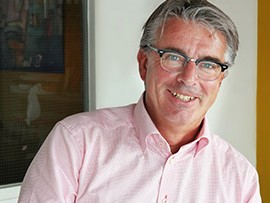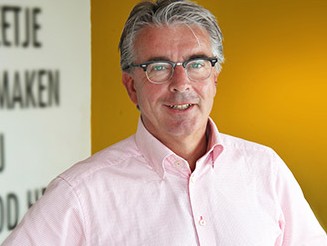
Ten captains of industry have been specially invited to submit a food waste issue for the Stop food Waste Symposium (6 November in Amsterdam); ten conceptual thinkers will consider the issues and devise solutions to them. One of those captains of industry is Johan Pater, co-owner of Bake Five.
Bake Five is an umbrella organisation for 12 independent bakeries who supply products to the bakery and patisserie departments of over 1,500 Dutch supermarkets on a daily basis. The bakeries collaborate closely in terms of product development, purchasing, marketing and quality assurance.
Johan Pater: “A huge amount of bread is thrown away in the Western world, and that fact is also substantiated by government research1. In other words, if we want to reduce food waste, bread represents a big step in the right direction. The problem is that too many people regard bread as having little value. We live in a ‘disposable’ society and don’t hesitate to throw it away. Things are different in other parts of the world. Fifteen years ago we set up the Bake for Life foundation. Since then, the charity has opened 5 bakeries - in Ghana, Kenya and Uganda – where young handicapped people are trained to become bakers so that they can earn money of their own. Each bakery project has a dedicated project leader in The Netherlands. When we told them about our problem, they were really shocked that people in the West allow their bread to go mouldy! It never gets that far in their countries; food – including bread – is simply too precious to them. Our issue is focused on solving the problem of consumers wasting so much bread: we want less bread to end up in people’s rubbish bins at home because that bread does not get recycled. That’s why we asked the conceptual thinkers: ‘How can we change the consumer mindset in The Netherlands so that people start to appreciate the value of bread again?’ We know that it’s about increasing awareness. But how can we kick-start that process?
The ‘theory of thinking’ makes a distinction between countless forms of thinking, and we can think in many different ways: based on experience, knowledge, comprehension or application; systematic, visual, evaluative or practical thinking; analytical versus holistic, critical or even magical; creative or problem-solving. And now there is also ‘conceptual thinking’.
The British doctor and psychologist Edward de Bono is regarded as the founding father of what is also known as ‘lateral thinking’. The idea is that we can devise more creative solutions for the complex problems facing humanity by activating our brains differently. In the conceptual era, which is where we currently find ourselves, it is about forming combinations between the left and right sides of the brain. Both sides are necessary to arrive at the right context in order to give meaning to things. This enables us to identify more effective solutions for today’s complicated problems. And food waste is one example of such a problem.
One possible solution for that problem was formulated by Edward de Bono: “Imagine if we keep food packages and prices as they currently are, but that we reduce the contents by 15 percent. Consumers continue to make the same purchases as always, except they receive less. The reason is explained to them on the packaging: the amount that they would probably end up wasting has already been removed. Consumers then have a choice: to consume less, or to spend more. The advice is to consume less, and that’s probably what they would end up doing. Hence, the habit of reduced consumption is formed gradually, plus this approach also addresses the problem of obesity. Any extra profit generated for the manufacturer is subsequently donated to a charity which tackles starvation elsewhere in the world; otherwise, consumers will feel cheated.”
“Corporate Social Responsibility plays an essential role within our company. For example, during negotiations with suppliers and customers we discuss packaging – our aim is to reduce the amount of packaging, which is why we’ve reduced the thickness of the plastic by a few microns. That results in a significant reduction in the total amount of plastic used.”
“We are continuously focusing on process optimisation in our bakeries but it will always be necessary to dispose of a small amount. Some of the bread will unavoidably end up as waste during the baking process. Furthermore, not all of the bread stocked by supermarkets gets sold. The bakers themselves take care of processing the return flows. We collaborate with the certified waste-processing company FeedValid which is specialised in the collection and processing of residual products from the food industry. The company converts those components into products for the animal feed industry. This enables the bread remnants and the return flows of bread to remain in the food chain.”
“Additionally, we obtain value from some of our old bread by separating out the starch, which is then used to make biodegradable bin liners and films, among other things. The manufacturing process produces significantly lower carbon emissions than in the case of normal plastic – the environmental burden is at least 20 percent less than plastic made from oil.”
“Put it in the toaster, make French toast or toasted sandwiches! Knowledge transfer would help too: people no longer know what is and isn’t safe to eat. Many consumers rely entirely on the best-before date and throw products away as soon as they are one day past that date. In other countries, such as the UK and Australia, tackling food waste is much higher on the political agenda, and it’s a hot item among the general public too. As far as I’m concerned, it should be much more of a topic of social debate in The Netherlands.”
“I don’t see that as a problem. It’s about consuming less, not more! The consumer decides in the end, but you can’t change consumer behaviour overnight. The think tank results are expected to drastically reduce food waste throughout the entire food supply chain and help companies to boost their turnover. I’m really looking forward to hearing the think tank’s solution. The captains will be presenting the results during the Stop Food Waste Symposium on 6 November.”
1. www.rijksoverheid.nl/onderwerpen/voeding/voedselverspilling
2. www.wageningenur.nl/nl/Dossiers/dossier/Dossier-Voedselverspilling.htm

Considerable effort will be necessary in order to achieve the Dutch government’s objective of reducing the amount of food waste in the country by 20% between 2009 and 2015, concluded researchers from Wageningen UR Food & Biobased Research in the second update of the ‘Monitor Voedselverspilling’ report which was published in early July 2014. According to the researchers, no significant progress was made between 2009 and 2012. Therefore, they call for the use of sector-specific data which will provide a better view of the causes of food waste and hence offer both the government and the industry concrete starting points for effective measures.
The basis for the Monitor Voedselverspilling – which Food & Biobased Research prepared between 2011 and 2012 on behalf of the Dutch Ministry of Economic Affairs – is formed by the analysis of flows of raw materials and foodstuffs through the entire chain, from producers up to and including consumers and waste processors. The publication not only reveals waste from the flows within the regular food chain, but also indicates the destination of those flows.
Source: Bakefive